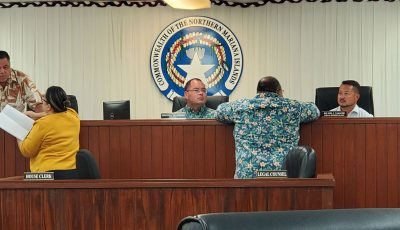House unanimously passes revised budget bill
The House of Representatives unanimously passed Friday afternoon a bill that repeals and re-enacts Public Law 22-22, or the fiscal year 2023 appropriations and budget law.
All 20 House members voted “yes” to the passage of House Bill 23-31, House Substitute 1. The bill was then transmitted to the Senate for action.
As this developed, the Senate agreed during a special session late Friday afternoon to refer House Bill 23-31, HS1, to the Senate Fiscal Affairs Committee, which is chaired by Sen. Donald Manglona (Ind-Rota).
Manglona said the committee will meet this week to go over the House’s version of the revised budget bill and will discuss the changes that they made.
This comes soon after the Senate adopted House Concurrent Resolution 23-1 that agrees with the projected $116.19 million total local revenue and resources of the CNMI government that Gov. Arnold I. Palacios had identified as available for appropriation, to reflect proposed revisions to the fiscal year 2023 budget law, Public Law 22-22.
During the House session Friday, Ways and Means Committee chair Rep. Ralph N. Yumul (Ind-Saipan) formally introduced House Bill 23-31 in order to make revised appropriations of local funds for the operations of the CNMI government. Yumul said the bill will provide revised budget authority for the government for fiscal year 2023, starting from March 31, 2023, to Sept. 30, 2023.
The bill would also give Gov. Arnold I. Palacios with up to 50% reprogramming authority for the Executive Branch, but not to funds for the Legislature or Judiciary, as well as to funds appropriated to the legislative delegations.
Yumul said he moved to place the bill on that day’s calendar for action due to the time sensitivity of the bill as the American Rescue Plan Act funding—on which much of the previous budget depended on—is running out.
Before passing the legislation, Rep. Blas Jonathan T. Attao (Ind-Saipan) offered a substitute version that would require the Finance secretary to establish an account for deficit reduction. Attao said this will allow the administration to address the deficit of the CNMI government if it manages to collect more revenue than expected.
“As per the Constitution, we have two years to exhaust the deficits. That gives them the flexibility,” he said.
The House adopted Attao’s floor amendments and subsequently passed the bill.
House minority leader Patrick H. San Nicolas (R-Tinian) said the members of the minority voted in favor of the revised budget bill to ensure that government employees will be sustained at a 72-hour pay period instead of 64 hours.
“At the heart of our decision to support this bill is simply the livelihood of our government workforce and their families,” San Nicolas said.



























